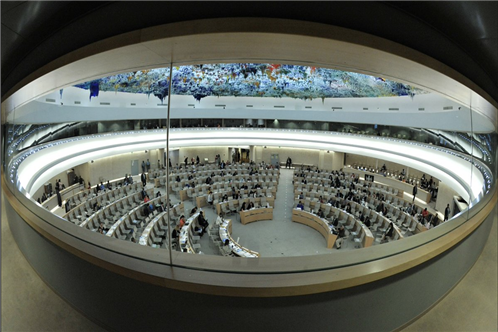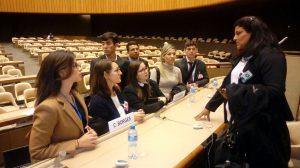Necessary Remedy
UN Forum debates reparations for people affected by collapse of Fundão waste dam

Companies, civil society, affected communities and government representatives met between November 27 and 29 in Geneva during the 6th Annual UN Forum on Business and Human Rights. The central theme of the event was “Realizing Access to Effective Remedy” for human rights violations committed by companies.
Conectas organized the panel “Settlement agreements and international standards on the right to effective remedy: lessons from the Mariana dam disaster”, which was moderated by Surya Deva, president of the UN Working Group on Business and Human Rights. Speaking on the panel was Regiane Soares, a fisherwoman from the municipality of Baixo Guandú affected by the disaster and a member of MAB (Movement of People Affected by Dams).
Soares explained the situation faced by her community and told of the difficulties negotiating compensation with Fundação Renova (the private foundation created to oversee reparations) and the companies involved. She said the monetary compensation does not cover the damage caused to the affected people, since most of the residents depended on the Doce River not only for subsistence but also for leisure and community activities. According to Soares, the recovery of the river is the only way to restore the life of the residents to what it was before the disaster and to ensure their livelihood in the future.

Picture showing the panel discussion organized by Conectas (Photo: Conectas/Joana Nabuco)
Conectas argued that the settlement agreement signed in March 2016 presents problems of legitimacy, efficacy and legality. The agreement did not include the participation of affected communities, it did not establish clear targets and results, it created obstacles to access to justice and it limited the responsibility of the public authorities and the companies for the disaster.
“Our goal was to show the inconsistencies of the first settlement agreement and how it has directly impacted the communities along the Doce River. We hope that the second agreement, presented in November 2017, focuses on correcting the previous flaws and on effectively catering to the needs of the affected people,” said Caio Borges, coordinator of the Environmental and Social Rights and Development program at Conectas.
The lawyer Shubhaa Srinivasan, partner at the British law firm Leigh Day, stressed that the imbalance of information and the disproportionate economic power between companies and affected communities are two major challenges in negotiating deals like the settlement agreement for the Doce River disaster. She said that to guarantee effective remedy, this process needs to be transparent and independent.
Borges also participated in another two sessions, in which he spoke about the implementation of the UN Guiding Principles on Business and Human Rights in Latin America and on the responsibility of export credit agencies and state financing agencies in the reparations. Joana Nabuco, a fellow lawyer from the Environmental and Social Rights and Development program, also participated on a panel and spoke about how to redress and prevent attacks against human rights defenders working on business and human rights.


